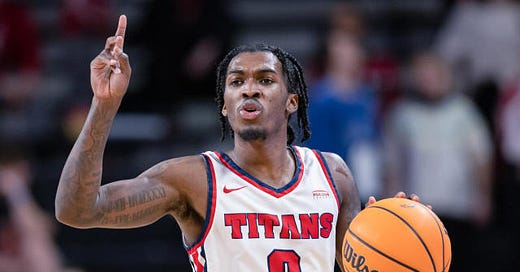It’s College Basketball Week here at Undrafted! In honor of March Madness, we’re doing a week of all college basketball content, with a new post dropping (hopefully) every day. Yesterday we looked at the concept of fairness and “merit”; today we’re looking at records and Antoine Davis. Stay tuned for more!
I can’t say I usually pay much attention to the CBI, college basketball’s third-tier playoff tournament, but this year I was pretty curious about whether they would offer a spot to Detroit Mercy, whose star player, Antoine Davis, was a mere four points (4!) from breaking Pete Maravich’s record for most points in the history of Division I basketball. Detroit Mercy was only 14-19 this year, but the CBI is a pay-for-play tournament that is fighting for relevance against both the NCAA Tournament and the NIT. Surely there was a temptation to exploit both the team’s desire to get Davis the record (Detroit Mercy’s head coach is Antoine’s father), as well as general curiosity about this record.
But, alas, the record will survive and Davis’ career will end with only 3,664 points, as the CBI decided not to offer Detroit Mercy a bid.
Of course, most college basketball fans are relieved. Maravich’s record is sacrosanct, having stood for over 50 years, and Pistol Pete himself was one of the biggest college basketball stars ever produced,* so watching the record fall at all, let alone to some guy nobody has ever heard of playing at a school nobody has ever heard about, would be pretty anticlimactic.
*Maravich is in that weird category of guys who had GOOD pro careers (unlike famous busts like Adam Morrison and Greg Oden) but somehow never recaptured the level of stardom they had in college. Patrick Ewing and Shane Battier are also in this category…
The other thing looming over this record chase is the many structural advantages Davis had over Maravich, which explain why the latter was such a star while the former is pretty anonymous, despite scoring virtually the same number of points:
Maravich played in an era before the three-point line, while Davis has taken 1,566 three-point shots in his career. Of course, Maravich took many shots that WOULD have counted for three points under today’s rules, and some efforts to chart his shots suggest his scoring totals would have increased by ~30% had he played with the three-point line.
Maravich scored 3,667 points in just three years, since the NCAA did not allow freshmen to play on varsity teams in the 1960s. Davis, on the other hand, has had not just four years, but FIVE, since the NCAA granted players extra eligibility after the pandemic. As a result, Maravich scored nearly 20 more points per game than Davis has during his career.
These two huge differences between their environments show why any comparison between Maravich and Davis is misguided. But nobody is really disputing that. I doubt even Davis himself would claim he’s as good a player as Maravich was. Maravich isn’t remembered because he holds this record — the only reason anyone cares about this record is because Maravich holds it. (The rest of the list of top career college scorers is not exactly a list of superstars… you have go all the way down to Oscar Robertson at #12 before you get a truly great player.)
On a podcast I was listening to before Davis’ final game, one of the hosts complained that a classic college basketball trivia question was about to get a lot harder. And while I understood what he meant, it’s kind of a funny observation. After all, if you were trying to logically deduce the answer to the question, “Who has the most points in college basketball history?” you would obviously try to think of someone who had access to the three-point line, and maybe someone who played an unusually large number of games (like maybe because of a global pandemic). The ONLY people who would say Pete Maravich are people who already know that’s the right answer.
But this is what people WANT out of records. They want the scoring record to look like something someone did by himself, not the result of environmental factors. Except, you can’t isolate an individual from his environment, and it’s foolish to try. This doesn’t mean we can’t celebrate individual achievements — but that the right way to do so involves comparing people to others in their environment.
This whole thing feels very reminiscent of Aaron Judge’s pursuit of the American League home run record last year. There was all sorts of talk over what the “real” record was and who really “deserved” to be the home run king, all of which revolved around steroids and how various home run hitters were tainted by their connections to steroids. Meanwhile, everyone overlooked the actual context of Judge’s feat: He hit 62 home runs in an environment that was unusually hostile to home runs. He led the majors in home runs by 16 and hit 55% more than anyone else in the AL — numbers not seen since Babe Ruth.
In other words, you don’t have to give up on celebrating individuals by recognizing material causes and explanations. In fact, you can usually appreciate individual accomplishments even better when you understand their context. The fact that Maravich’s record has now withstood even this unique confluence of events that produced Antoine Davis illustrates just how amazing his college career was. But the record itself isn’t what tells us that…



